St. Francis of Assisi Weekly Reflections

Eternal Life
08-25-2024Weekly ReflectionWe Celebrate Worship Resource, Vol. 49, No. 1For the past three weeks, we have heard Jesus tell the crowds that he is the Bread of Life, sent from heaven to sacrifice his body and shed his blood for the life of the world. It is now up to us to make a choice. Do we choose to believe this and eat his flesh and drink his blood, receiving eternal life within us? Or is this too great a demand, to literally make Jesus Christ central to our very being? This is the challenge Jesus gives to his disciples in today’s Gospel and to us now. First, we hear Joshua issue a similar challenge to all the tribes of Israel. He testifies first: “As for me and my household, we will serve the Lord” (Joshua 24:15). The people all follow suit. But the response to Jesus is not unanimous. “Many of his disciples returned to their former way of life and no longer accompanied him” (John 6:66). Jesus’ way of life was too radical. For if we truly accept Jesus within us, if we truly believe that he has “the words of eternal life” (John 6:68), then we must live out those words with all our being.
How do you show the choice you’ve made to believe in the Lord and make him central to your very being?
Vida Eterna
Durante las últimas tres semanas, hemos escuchado a Jesús decir a las multitudes que él es el Pan de Vida, enviado del cielo para sacrificar su cuerpo y derramar su sangre por la vida del mundo. Ahora nos toca a nosotros hacer una elección. ¿Elegimos creer esto y comer su carne y beber su sangre, recibiendo la vida eterna dentro de nosotros? ¿O es esta una exigencia demasiado grande, hacer literalmente que Jesucristo sea el centro de nuestro ser? Este es el desafío que Jesús les da a sus discípulos en el Evangelio de hoy y a nosotros ahora. Primero, escuchamos a Josué lanzando un desafío similar a todas las tribus de Israel. Él testifica primero: “En cuanto a mí y mi casa, serviremos al Señor” (Josué 24:15). Todo el pueblo sigue su ejemplo. Pero la respuesta a Jesús no es unánime. “Muchos de sus discípulos volvieron a su antigua manera de vivir y ya no lo acompañaban” (Juan 6:66). El estilo de vida de Jesús era demasiado radical. Porque si verdaderamente aceptamos a Jesús dentro de nosotros, si verdaderamente creemos que Él tiene “palabras de vida eterna” (Juan 6:68), entonces debemos vivir esas palabras con todo nuestro ser.
¿Cómo demuestras la elección que has hecho de creer en el Señor y hacerlo central en tu propio ser?

The Bread From Heaven
08-18-2024Weekly ReflectionWe Celebrate Worship Resource, Vol. 49, No. 1“Eat healthy!” we’re told. We check the nutrition facts on the label to see if the foods we eat are high fiber and vitamins and low in fat and cholesterol. Our physical health depends a lot on what we eat. So does our spiritual health, just in a different way. In today’s first reading, Wisdom, personified as a woman, generously offers food and wine to increase understanding. The psalmist tells us that God’s goodness can be tasted. Paul advises us to be filled with the Spirit and not drunk with wine. Then in the Gospel, Jesus repeats what he has been trying to get the crowds to understand. “I am the living bread that came down from heaven; whoever eats this bread will live forever” (John 6:51). He goes on to say, “Whoever eats my flesh and drinks my blood remain in me and I in [them]” (6:56). Jesus is making it clear that we are to take this literally, using the word trogo, which translates as to chew or to gnaw. It is a physical action, one in which Jesus’ body and blood, sacrificed on the cross, become part of us, nourishing us, strengthening us, energizing us. After all, we are what we eat.
How do you show that you have the body and blood of Christ in you?
El Pan Del Cielo
“¡Come sano!”, nos dicen. Comprobamos la información nutricional de las etiquetas para ver si los alimentos que comemos tienen un alto contenido de fibra y vitaminas y un bajo contenido de grasas y colesterol. Nuestra salud física depende mucho de lo que comemos. También depende nuestra salud espiritual, solo que de una manera diferente. En la primera lectura de hoy, la Sabiduría, personificada como una mujer, ofrece generosamente comida y vino para aumentar la comprensión. El salmista nos dice que la bondad de Dios se puede saborear. Pablo nos aconseja que nos llenemos del Espíritu y no nos emborrachemos con vino. Luego, en el Evangelio, Jesús repite lo que ha estado tratando de hacer entender a las multitudes. “Yo soy el pan vivo que bajó del cielo; el que come de este pan vivirá para siempre” (Juan 6:51). Continúa diciendo: “El que come mi carne y bebe mi sangre permanece en mí y yo en él” (6:56). Jesús está dejando en claro que debemos tomar esto literalmente, usando la palabra trogo, que se traduce como masticar o roer. Es una acción física, en la que el cuerpo y la sangre de Jesús, sacrificados en la cruz, se hacen parte de nosotros, nos nutren, nos fortalecen, nos dan energía. Al fin y al cabo, somos lo que comemos.
¿En qué puedes hacer para seguir siendo el cuerpo de Cristo para los demás?

Whoever Eats This Bread Will Live Forever
08-11-2024Weekly ReflectionWe Celebrate Worship Resource, Vol. 49, No. 1God gives life. That God gives life to the world is an image that goes back to creation, for God is seen as the author of creation, the creator of all life. Now, in Jesus, God has given us life eternal. As Jesus points out in today’s Gospel, the Chosen People survived the desert on the manna God gave them, but in the end they died, just as we all do. But Jesus’ promise is much more than a homeland of our own; he promises that whoever eats the bread he gives will live forever. The manna sent by God nourished people for this life; Jesus, the living bread sent by God, nourishes us for eternal life. Moreover, Jesus tells the crowds that “the bread that I will give is my flesh for the life of the world” (John 6:51). Since we become what we receive, the Eucharist that we receive transforms us into the body of Christ. This resonates with Paul’s words to the Ephesians: “be imitators of God”: to be kind, compassionate, forgiving, and loving (5:1). The Bread of Life enables us to be the body of Christ for others.
What can you do to further become the body of Christ for others?
El Que Coma De Este Pan Vivirá Para Siempre
Dios da la vida. Que Dios dé vida al mundo es una imagen que se remonta a la creación, pues Dios es visto como el autor de la creación, el creador de toda vida. Ahora, en Jesús, Dios nos ha dado la vida eterna. Como Jesús señala en el Evangelio de hoy, el Pueblo Elegido sobrevivió al desierto con el maná que Dios le dio, pero al final murió, como todos nosotros. Pero la promesa de Jesús es mucho más que una patria propia; promete que quien coma el pan que él da vivirá para siempre. El maná enviado por Dios alimentó a la gente para esta vida; Jesús, el pan vivo enviado por Dios, nos alimenta para la vida eterna. Además, Jesús dice a las multitudes que “el pan que yo daré es mi carne para la vida del mundo” (Juan 6:51). Puesto que nos convertimos en lo que recibimos, la Eucaristía que recibimos nos transforma en el cuerpo de Cristo. Esto resuena con las palabras de Pablo a los Efesios: “sed imitadores de Dios”: ser amables, compasivos, perdonadores y amorosos (5:1). El Pan de Vida nos permite ser el cuerpo de Cristo para los demás.
¿En qué puedes hacer para seguir siendo el cuerpo de Cristo para los demás?

The Bread of Life
08-04-2024Weekly ReflectionWe Celebrate Worship Resource, Vol. 49, No. 1The spirits of the Chosen People had hit rock bottom. Day after day after day they had been wandering in the desert. Reaching the so-called promised land seemed hopeless. They would starve first. Moses appeals to God for something, anything, to give them sustenance, to give them hope, to enable them to go on. God responds by raining down mana for them. Bread from heaven! Centuries later, humanity is wandering in the desert of sin and death. Only a handful of prophets realize that death and sin could be overcome. But once again, God sends bread from heaven to sustain us and bring us life. This time that bread is Jesus, the Bread of Life. This Bread, whom we receive in the Eucharist, nourishes and sustains us on our journey through the valley of sin and death to the kingdom, to eternal life. Let us remain ever hopeful, no matter how difficult or bleak our journeys may be, for God has promised us a place in the kingdom and has given us the Bread of Life to lead us there.
How do you pass on what your receive—the bread of life—to others?
El Pan de Vida
Los espíritus del Pueblo Elegido habían tocado fondo. Día tras día habían estado vagando por el desierto. Alcanzar la llamada tierra prometida parecía imposible. Primero morirían de hambre. Moisés pide a Dios algo, cualquier cosa, para darles sustento, darles esperanza, permitirles seguir adelante. Dios responde haciendo llover maná para ellos. ¡Pan del cielo! Siglos después, la humanidad vaga por el desierto del pecado y la muerte. Sólo un puñado de profetas se dan cuenta de que la muerte y el pecado pueden ser superados. Pero una vez más, Dios envía pan del cielo para sostenernos y darnos vida. Esta vez ese pan es Jesús, el Pan de Vida. Este Pan, que recibimos en la Eucaristía, nos nutre y sostiene en nuestro camino por el valle del pecado y de la muerte hacia el reino, hacia la vida eterna. Mantengamos siempre la esperanza, no importa cuán difíciles o sombríos puedan ser nuestros viajes, porque Dios nos ha prometido un lugar en el reino y nos ha dado el Pan de Vida para llevarnos allí.
¿Cómo puedes transmitir lo que recibes—el pan de vida—a otros?
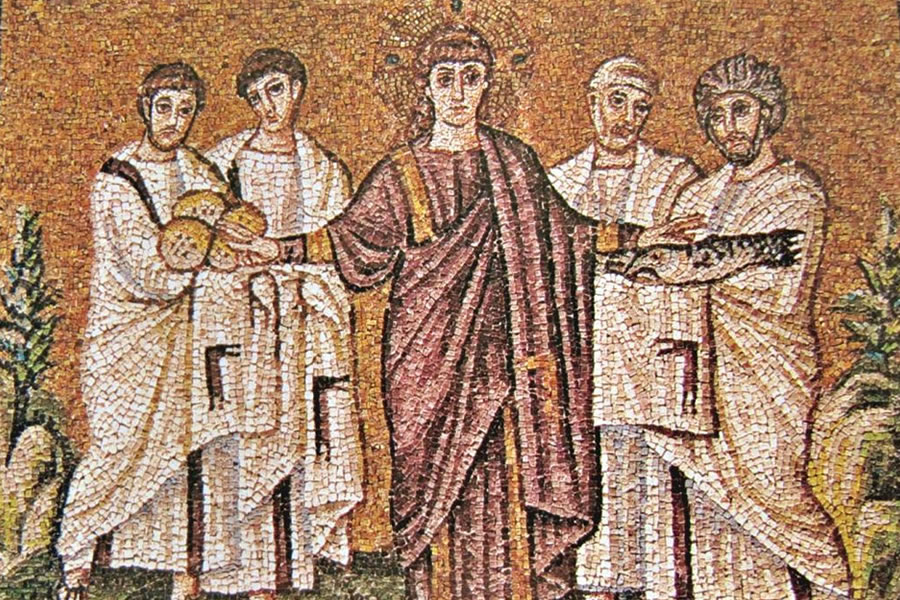
Feeding Thousands
07-28-2024Weekly ReflectionWe Celebrate Worship Resource, Vol. 49, No. 1All four evangelists tell the story of the five loaves and two fish, but John adds a detail at the end of this account that the others don’t. He writes, “When the people saw the sign he had done, they said, “This is truly the Prophet, the one who is to come into the world” (John 6:14). First, note that John refers to Jesus’ miracles as signs, for they lead people to believe in him. Indeed, Jesus truly was the one they anticipated: The Messiah, the Christ. But John goes on to say that Jesus realized that the crowd would “carry him off to make him king,” which is not the kind of Messiah he was (6:15). They believed, but they did not understand. In the coming weeks we will hear Jesus refer to himself as the bread of life and explain that he gives himself to everyone who comes to him and that they will never hunger again. But for today, he takes five loaves of bread, gives thanks, and fills the hungry bellies of thousands, with bread left over for many more (twelve symbolizing every tribe of Israel). For them and for us, the miracle is a sign of God’s overflowing generosity, ensuring that we all are fed.
How can you help to see that many are fed, in imitation of Jesus?
Alimentando A Miles
Los cuatro evangelistas cuentan la historia de los cinco panes y los dos peces, pero Juan agrega un detalle al final de este relato que los demás no agregan. Él escribe: “Cuando la gente vio la señal que había hecho, dijeron: “Éste es verdaderamente el Profeta, el que ha de venir al mundo” (Juan 6:14). Primero, observe que Juan se refiere a los milagros de Jesús como señales, porque llevan a la gente a creer en él. De hecho, Jesús verdaderamente era el que esperaban: el Mesías, el Cristo. Pero Juan continúa diciendo que Jesús se dio cuenta de que la multitud “se lo llevaría para hacerlo rey”, que no es la clase de Mesías que él era (6:15). Creyeron, pero no entendieron. En las próximas semanas escucharemos a Jesús referirse a sí mismo como el pan de vida y explicar que se entrega a todo aquel que viene a él y que nunca más volverá a tener hambre. Pero por hoy, toma cinco panes, da gracias y llena los estómagos hambrientos de miles, con pan sobrante para muchos más (doce simbolizan cada tribu de Israel). Para ellos y para nosotros, el milagro es un signo de la generosidad desbordante de Dios, que garantiza que todos estemos alimentados.
¿Cómo puedes ayudar a que muchos sean alimentados, a imitación de Jesús?

Like Sheep without a Shepherd
07-21-2024Weekly ReflectionWe Celebrate Worship Resource, Vol. 49, No. 1It is no accident that sheep are mentioned in the Bible so often. Domesticated in ancient times, they played a central role in the life of village or rural area, as they were a primary source of food and clothing. Shepherds cared for them, seeing to it that they were safe and well fed. So it makes sense for Jesus to speak of sheep and shepherds, just as Old Testament figures had done. When Jesus sees a crowd of people moving as one to the opposite side of the lake, he visualizes a flock of sheep moving to a verdant pasture. Realizing that they had no one to guide them, his heart is moved with compassion, and he steps in to shepherd them. Though he had planned to rest a while with his disciples, and in fact may not know any of them personally. But they need him, much as we do even today. We can trust that Jesus is always available to teach us, guide us, to care for us. Like sheep who are loved and cared for, we can depend on our shepherd.
How does Jesus guide you and care for you like a shepherd?
Como Ovejas Sin Pastor
No es casualidad que las ovejas se mencionen con tanta frecuencia en la Biblia. Domesticados en la antigüedad, desempeñaban un papel central en la vida de las aldeas o zonas rurales, ya que eran una fuente primaria de alimento y vestido. Los pastores las cuidaban, asegurándose de que estuvieran seguras y bien alimentadas. Por eso tiene sentido que Jesús hable de ovejas y pastores, tal como lo habían hecho los personajes del Antiguo Testamento. Cuando Jesús ve una multitud de personas moviéndose al unísono hacia el lado opuesto del lago, visualiza un rebaño de ovejas moviéndose hacia un pasto verde. Al darse cuenta de que no tenían a nadie que los guiara, su corazón se conmueve con compasión y interviene para pastorearlos. Aunque había planeado descansar un rato con sus discípulos y, de hecho, es posible que no conozca a ninguno de ellos personalmente. Pero lo necesitan, tanto como lo necesitamos nosotros incluso hoy. Podemos confiar en que Jesús siempre está disponible para enseñarnos, guiarnos y cuidar de nosotros. Como ovejas amadas y cuidadas, podemos depender de nuestro pastor.
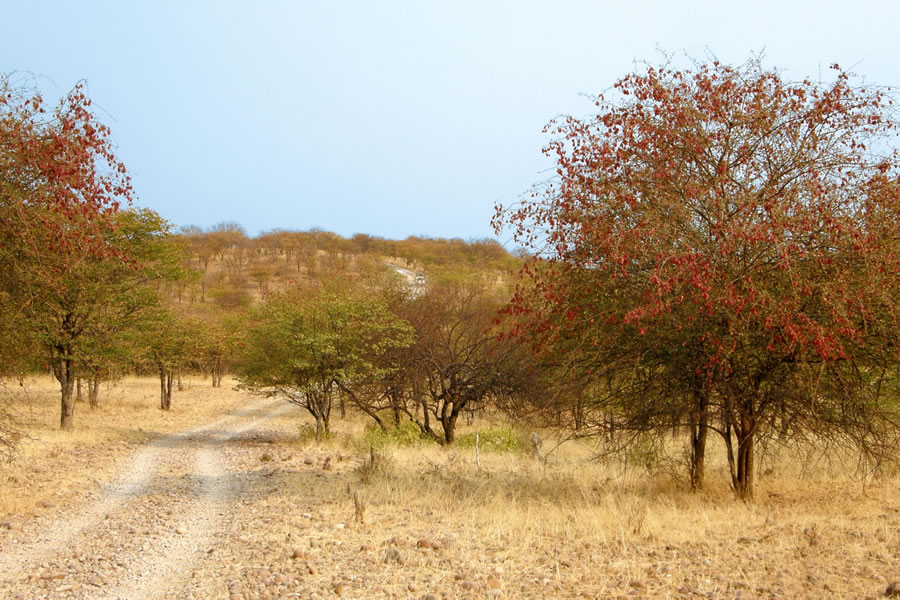
Jesus Sent the Twelve
07-14-2024Weekly ReflectionWe Celebrate Worship Resource, Vol. 49, No. 1It isn’t easy to be God’s messenger. You try telling people what they don’t want to hear! God sent the unassuming shepherd Amos to Bethel to denounce the injustice and greed of Israel. Jesus sent the twelve apostles to the villages of Galilee to preach repentance. Amos was rejected at once and ordered to flee home to Judah. The Twelve enjoyed success, however, curing the sick and driving out demons. But they didn’t have it easy. They traveled empty-handed: no food, no change of clothes, no possessions, no money. Did Jesus want to make them dependent on the very strangers they were calling on to repent? No, he wanted them to realize their dependence on God. Therefore, Jesus gives them nothing but one thing God gave Amos: the authority to speak in God’s name. Though we are neither prophets nor apostles, we are called to be disciples by virtue of our baptism. As disciples, we now have the mission to spread the Good News. We can depend on God to accompany us as we give witness to our faith.
In what ways can you carry out the Christian mission through your parish, at your workplace, or in your community?
Jesús Envió A Los Doce
No es fácil ser mensajero de Dios. ¡Intenta decirle a la gente lo que no quieren oír! Dios envió al humilde pastor Amós a Betel para denunciar la injusticia y la avaricia de Israel. Jesús envió a los doce apóstoles a las aldeas de Galilea para predicar el arrepentimiento. Amós fue rechazado una vez y se le ordenó huir a su hogar en Judá. Sin embargo, los Doce tuvieron éxito curando a los enfermos y expulsando demonios. Pero no lo tuvieron fácil. Viajaron con las manos vacías: sin comida, sin muda de ropa, sin posesiones, sin dinero. ¿Quería Jesús hacerlos dependientes de los mismos extraños a quienes llamaban al arrepentimiento? No, él quería que se dieran cuenta de su dependencia de Dios. Por lo tanto, Jesús no les da nada más que una cosa que Dios le dio a Amós: la autoridad para hablar en el nombre de Dios. Aunque no somos profetas ni apóstoles, somos llamados a ser discípulos en virtud de nuestro bautismo. Como discípulos, ahora tenemos la misión de difundir la Buena Nueva. Podemos depender de Dios para que nos acompañe mientras damos testimonio de nuestra fe.
¿De qué manera puedes llevar a cabo la misión cristiana a través de tu parroquia, en tu lugar de trabajo o en tu comunidad?
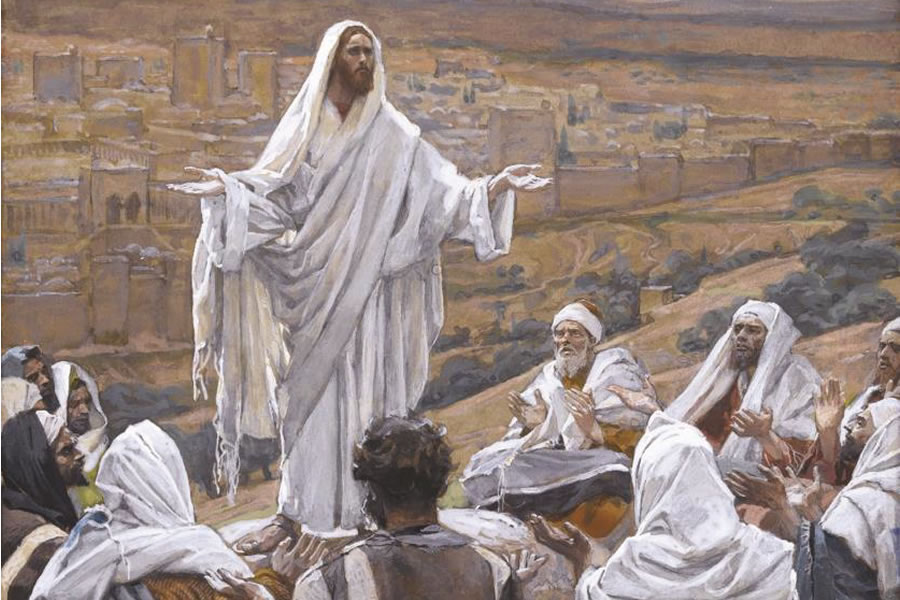
Faith in Action
07-07-2024Weekly ReflectionWe Celebrate Worship Resource, Vol. 49, No. 1Of Jesus’ visit to his hometown, Mark says, “He was amazed at their lack of faith” (Mark 6:6). Recall, he had just encountered two people of extremely strong faith: the woman with hemorrhages and the synagogue official whose daughter was near death. Jesus healed the woman and raised the child, as we heard last week. Jesus remarked upon the faith of both, faith that the two made visible by turning to the Lord in their t ime of need. This is the kind of faith that Jesus calls us to have: one that we give witness to in the way we live our lives, make our choices, and treat others. The people of Nazareth, however, showed no faith, “So he was not able to perform any mighty deed there” (Mark 6:5). Yet Jesus cures a few sick people before departing. Even among an unbelieving people, Jesus’ grace changes lives. His healing touch, his loving presence, his redemptive suffering, can penetrate even weak or wavering faith. May today’s Gospel be a consolation to us.
How does your faith (or lack of faith) show in the way you act? How do you put your faith into action?
Fe En Acción
De la visita de Jesús a su ciudad natal, Marcos dice: “Quedó asombrado de su falta de fe” (Marcos 6:6). Recordemos que acababa de encontrarse con dos personas de fe extremadamente fuerte: la mujer con hemorragias y el funcionario de la sinagoga cuya hija estaba al borde de la muerte. Jesús sanó a la mujer y sanó al niño, como escuchamos la semana pasada. Jesús destacó la fe de ambos, fe que los dos hicieron visible al volverse al Señor en su momento de necesidad. Este es el tipo de fe que Jesús nos llama a tener: una fe de la que damos testimonio en la forma en que vivimos nuestras vidas, tomamos decisiones y tratamos a los demás. El pueblo de Nazaret, sin embargo, no mostró fe: “Y no pudo hacer allí ningún milagro” (Marcos 6:5). Sin embargo, Jesús cura a algunos enfermos antes de partir. Incluso entre un pueblo incrédulo, la gracia de Jesús cambia vidas. Su toque sanador, su presencia amorosa, su sufrimiento redentor pueden penetrar incluso la fe débil o vacilante. Que el Evangelio de hoy sea un consuelo para nosotros.
¿Cómo se muestra tu fe (o falta de fe) en tu forma de actuar? ¿Cómo pones tu fe en acción?

Just Have Faith
06-30-2024Weekly ReflectionWe Celebrate Worship Resource, Vol. 49, No. 1God is good. God is love. God is life. These are fundamental truths of our faith. We are reminded in the first reading that we are created in God’s image. Therefore, we are created to be good always, to love one another, and to live forever. However, because of original sin, we must rely on God’s mercy for all three. We strive to be good always, and to repent and seek forgiveness when we aren’t. We are challenged to love God and to love our neighbor. We hope to live eternally with God. This is what our faith calls us to do. In the Gospel, we meet two people with strong faith: a woman with hemorrhages and Jairus, a religious official whose daughter is near death. Each of them seeks out Jesus and his healing touch. They are rewarded specifically for their faith. “Your faith has saved you,” he tells Jairus (5:36). Our faith can save us as well, drawing us to God, our ultimate source of goodness, love, and life.
How does your faith influence the way you regard goodness, love, and life?
Basta Que Tengas Fe
Dios es bueno. Dios es amor. Dios es vida. Estas son verdades fundamentales de nuestra fe. En la primera lectura se nos recuerda que somos creados a imagen de Dios. Por lo tanto, fuimos creados para ser buenos siempre, para amarnos unos a otros y para vivir para siempre. Sin embargo, debido al pecado original, debemos confiar en la misericordia de Dios para los tres. Nos esforzamos por ser buenos siempre y por arrepentirnos y buscar el perdón cuando no lo somos. Tenemos el desafío de amar a Dios y amar a nuestro prójimo. Esperamos vivir eternamente con Dios. Esto es lo que nuestra fe nos llama a hacer. En el Evangelio encontramos a dos personas con una fe fuerte: una mujer con hemorragias y Jairo, un funcionario religioso cuya hija está al borde de la muerte. Cada uno de ellos busca a Jesús y su toque sanador. Son recompensados específicamente por su fe. “Tu fe te ha salvado”, le dice a Jairo (5:36). Nuestra fe también puede salvarnos a nosotros, atrayéndonos a Dios, nuestra fuente suprema de bondad, amor y vida.
¿Cómo encuentras refugio en tu fe en momentos de ansiedad o pérdida?
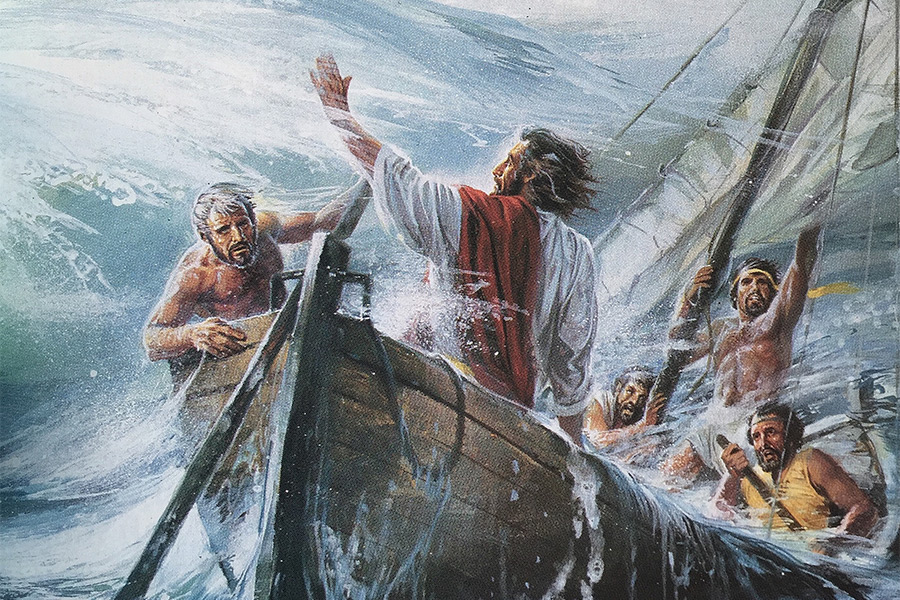
Do You Have Faith?
06-23-2024Weekly ReflectionWe Celebrate Worship Resource, Vol. 49, No. 1After Jesus calms the storm in today’s Gospel, he asks his terrified disciples, “Do you not yet have faith?” (Mark 4:40). This question is very important for Mark, for he was trying to guide his Gentile audience to faith in the Lord amid Roman persecution. Therefore, he is sure to emphasize how the disciples’ faith only gradually overcame their fears. Recall that when the disciples first encountered Jesus, it was a calm, pleasant day by the Sea of Galilee, where they left everything behind to follow him. But now, during a frightening storm with their very lives in danger, their faith wavered. Their strong fear drove out their untested faith. But Jesus’ power over the storm, like God’s assurance to Job in the first reading, provides an opportunity for their faith in him to overcome their fear of the storm. Our faith is similarly tested by the storms in our lives. We too may feel as if Jesus is sleeping through our trials and hardships. But he remains with us always. He asks us to turn to him in our hour of need, to look to our faith to calm our fears.
How do you find refuge in your faith in times of anxiety or loss?
¿Y Tu, Tienes Fe?
Después de que Jesús calma la tormenta en el Evangelio de hoy, pregunta a sus aterrorizados discípulos: “¿Aún no tenéis fe?” (Marcos 4:40). Esta pregunta es muy importante para Marcos, porque estaba tratando de guiar a su audiencia Gentil a la fe en el Señor en medio de la persecución romana. Por lo tanto, seguramente enfatizará cómo la fe de los discípulos solo superó gradualmente sus temores. Recuerde que cuando los discípulos encontraron a Jesús por primera vez, era un día tranquilo y agradable en el Mar de Galilea, donde dejaron todo para seguirlo. Pero ahora, durante una tormenta aterradora con sus vidas en peligro, su fe flaqueó. Su fuerte temor ahuyentó su fe no probada. Pero el poder de Jesús sobre la tormenta, como la seguridad que Dios le dio a Job en la primera lectura, brinda una oportunidad para que su fe en Él supere su miedo a la tormenta. Nuestra fe es igualmente puesta a prueba por las tormentas en nuestras vidas. Nosotros también podemos sentir como si Jesús estuviera durmiendo durante nuestras pruebas y dificultades. Pero él permanece con nosotros siempre. Nos pide que recurramos a Él en nuestra hora de necesidad, que recurramos a nuestra fe para calmar nuestros miedos.
¿Cómo encuentras refugio en tu fe en momentos de ansiedad o pérdida?

Seed Grow Of Itself
06-16-2024Weekly ReflectionWe Celebrate Worship Resource, Vol. 49, No. 1It’s really amazing that we’re able to walk around with what amounts to a small computer in our pockets. If we need an answer, from who won last year’s Super Bowl to what nearby restaurant makes the best lasagna, we merely need to pull out our phoned and ask. But what about the big questions, like “Is this really love?” or “what is the meaning of life?” Paul’s advice to “walk by faith, not by sight” is sound (2Corinthians 5:7). After all, human knowledge is imperfect. In the parables we hear today, Jesus uses the example of seeds. We can’t see a mustard seed spit open under the soil and germinate. Nor can we see the inner working of a plant, which grows taller and sturdier and eventually produces fruit. Similarly, we can’t see the seeds of faith growing inside us, slowly leading us toward the kingdom of God. Yet we believe it is happening. We believe that we are part of it. And we believe that the kingdom that continues to grow each day is greater than all the smartphones in the world, and that one day we will all dwell in its branches, in God’s presence.
How have you sensed the seed of faith growing within yourself? What can you do this week to nurture your own seed of faith or another’s?
La Semilla Crece Por Sí Sola
Es realmente sorprendente que podamos caminar con lo que equivale a una pequeña computadora en nuestros bolsillos. Si necesitamos una respuesta, desde quién ganó el Super Bowl del año pasado hasta qué restaurante cercano hace la mejor lasaña, simplemente tenemos que sacar nuestro teléfono y preguntar. Pero ¿qué pasa con las grandes preguntas como “¿Es esto realmente amor?” o "¿cuál es el significado de la vida?" El consejo de Pablo de “andar por fe, no por vista” es acertado (2 Corintios 5:7). Después de todo, el conocimiento humano es imperfecto. En las parábolas que escuchamos hoy, Jesús usa el ejemplo de las semillas. No podemos ver una semilla de mostaza abierta bajo la tierra y germinar. Tampoco podemos ver el funcionamiento interno de una planta, que crece más alta y más robusta y eventualmente produce frutos. De manera similar, no podemos ver las semillas de la fe creciendo dentro de nosotros, conduciéndonos lentamente hacia el reino de Dios. Sin embargo, creemos que está sucediendo. Creemos que somos parte de ello. Y creemos que el reino que sigue surgiendo cada día es más grande que todos los teléfonos inteligentes del mundo, y que un día todos habitaremos en sus ramas, en la presencia de Dios.
¿Cómo has sentido que la semilla de la fe crece dentro de ti? ¿Qué puedes hacer esta semana para nutrir tu semilla de fe ganada o la de otros?
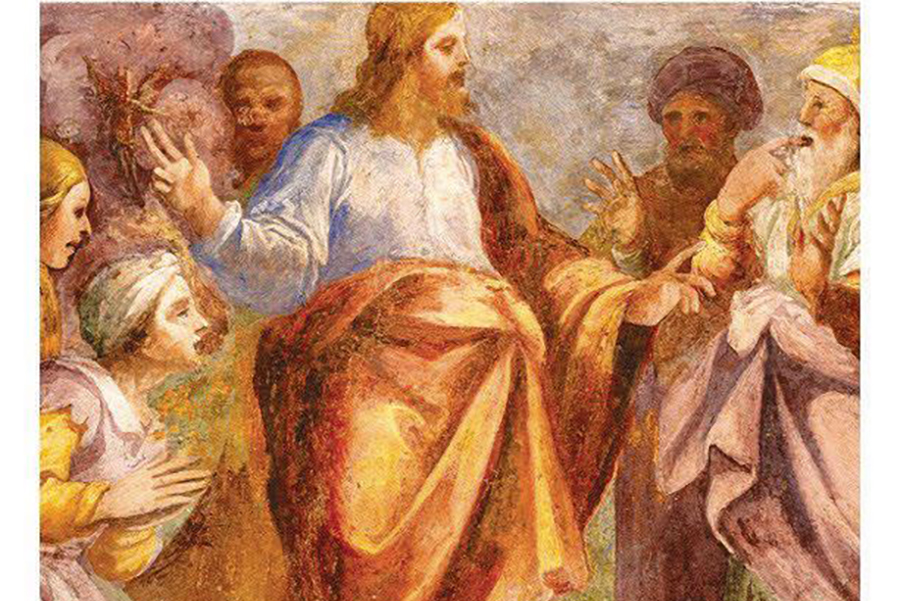
God’s Will
06-09-2024Weekly ReflectionWe Celebrate Worship Resource, Vol. 49, No. 1What do we do when we get caught doing something we know we shouldn’t? Do we accept responsibility and promise to do better? Or do we find someone else, anyone else, to blame? Both Adam and Eve choose the latter. Adam blames “the woman whom you were put here with me,” managing to blame both Eve and God in one excuse (Genesis 3:12). Eve blames the “tricky” serpent. Neither takes responsibility for their own sinfulness. What’s more, they drive a wedge between each other and between themselves and God. This is what happens when we blame someone else, even if they did play a role in it, like the serpent. We divide ourselves from whomever we’ve blamed. To paraphrase Jesus in the Gospel, when we divide ourselves from each other, we fall. Instead, we are called to take responsibility for what we’ve done and to reconcile with whomever we’ve wronged. Note that at the end of this passage Jesus says, “whoever does the will of God is my brother and sister and mother” (Mark 3:35). To be united with Jesus and the Christian family, do God’s will. Start with loving—not blaming—your neighbor.
When do you tend to blame someone else instead of taking responsibility yourself? How can you reconcile with your neighbor and God?
La Voluntad De Dios
¿Qué hacemos cuando nos pillan haciendo algo que sabemos que no deberíamos? ¿Aceptamos la responsabilidad y prometemos no volver a hacerlo? ¿O encontramos a alguien a quien culpar? Tanto Adán como Eva eligen lo último. Adán culpa a “la mujer que me diste como compañera”, logrando culpar tanto a Eva como a Dios con una sola excusa (Génesis 3:12). Eva culpa a la serpiente “astuta”. Ninguno de los dos se hace responsable de su propia pecaminosidad. Es más, abren una brecha entre ellos y entre ellos y Dios. Esto es lo que sucede cuando culpamos a alguien más, incluso si jugó un papel en ello, como la serpiente. Nos separamos de quienes hemos culpado. Parafraseando a Jesús en el Evangelio, cuando nos separamos unos de otros, caemos. En cambio, estamos llamados a asumir la responsabilidad de lo que hemos hecho y a reconciliarnos con quienes hemos hecho daño. Tenga en cuenta que al final de este pasaje Jesús dice: “Todo aquel que hace la voluntad de Dios ése es mi hermano, mi hermana y mi madre” (Marcos 3:35). Para estar unidos a Jesús y a la familia cristiana, hacer la voluntad de Dios. Empiece por amar, no culpar, a su prójimo.
¿Cuándo tiendes a culpar a otra persona en lugar de responsabilizarte tú mismo? ¿Cómo puedes reconciliarte con tu prójimo y con Dios?
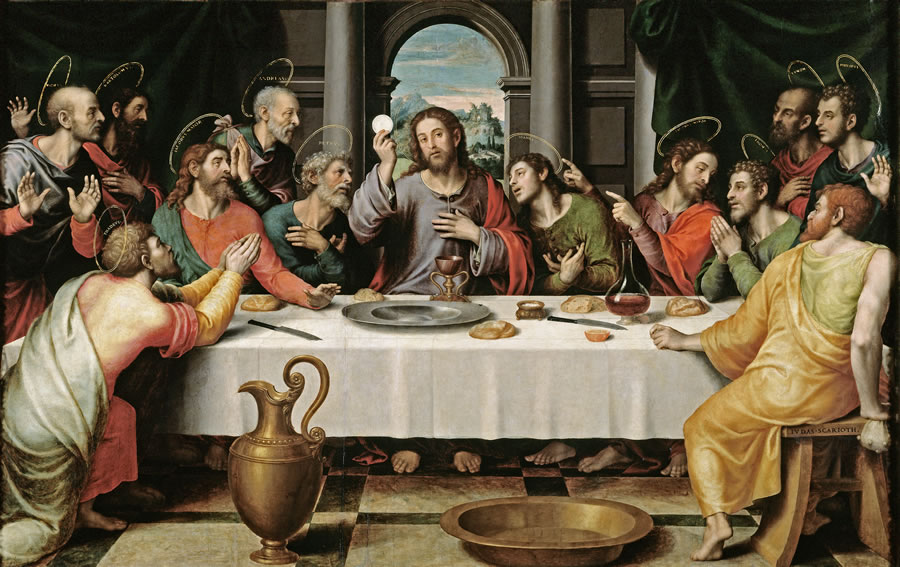
This Is My Blood Of The Covenant
06-02-2024Weekly ReflectionWe Celebrate Worship Resource, Vol. 49, No. 1We may think of the Eucharist that we celebrate today as going back almost two thousand years, and this is true, but its origins go back even further. As we hear in the first reading today, the Chosen People gathered around Moses, listened to him read God’s word aloud, then shared in the blood of the covenant. The animals were young and unblemished (hence, regarded as innocent) and their blood was considered to be their life force. Sacrificing these animals and sharing their blood bound the people to their God with their force of life. Jesus’ disciples would have recalled this ancient ritual when they gathered for the Passover, when he transformed this ritual by sharing the cup of wine, calling it his own blood. He became the innocent lamb who would go on to sacrifice himself in order to bring eternal life to all who shared in this ritual, this ritual we hear described in the Gospel, this ritual that we participate in today. To use the words of each Eucharistic Prayer, may “the blood of the new and eternal covenant,” poured out for us for our salvation, bind us ever more closely in love, in service, and in life to the Lord.
How does receiving Jesus’ body and blood in the Eucharist bind you to the covenant established in baptism?
Esta Es Mi Sangre De La Alianza
Podemos pensar que la Eucaristía que celebramos hoy se remonta a casi dos mil años atrás, y esto es cierto, pero sus orígenes se remontan aún más atrás. Como escuchamos en la primera lectura de hoy, el Pueblo Elegido se reunió alrededor de Moisés, lo escuchó leer la palabra de Dios en voz alta y luego compartió la sangre del pacto. Los animales eran jóvenes e inmaculados (por lo tanto, se los consideraba inocentes) y se consideraba que su sangre era su fuerza vital. Sacrificar estos animales y compartir su sangre unía al pueblo a su Dios con su fuerza vital. Los discípulos de Jesús habrían recordado este antiguo ritual cuando se reunieron para la Pascua, cuando Él transformó este ritual compartiendo la copa de vino, llamándola su propia sangre. Se convirtió en el cordero inocente que se sacrificaría para traer vida eterna a todos los que compartieran este ritual, este ritual que escuchamos descrito en el Evangelio, este ritual en el que participamos hoy. Para usar las palabras de cada Plegaria Eucarística, que “la sangre de la nueva y eterna alianza”, derramada por nosotros para nuestra salvación, nos una cada vez más estrechamente en amor, en el servicio y en la vida al Señor.
¿Cómo te vincula el recibir el cuerpo y la sangre de Jesús en la Eucaristía al pacto establecido en el bautismo?